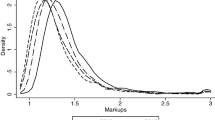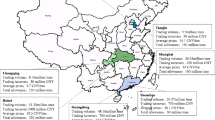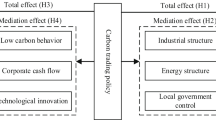Abstract
Emission trading system is a significant market-based environmental regulation tool worldwide. This study fills existing knowledge gap on whether ETSs have “weak” and “strong” version of Porter hypothesis effects in China, by examining the effects of the Chinese SO2 emission trading on corporate innovation and productivity. Using the micro-data of domestic-listed manufacturing companies from 2004 to 2015, this study regarded China’s SO2 emission trading system as a quasi-natural experiment by applying a difference-in-difference framework to eliminate endogenous problems. It was found that the SO2 emission trading system significantly promoted corporate innovation but did not have a significant effect on corporate productivity. The cause analysis showed that suboptimal institutional context and lack of corporate dynamic response led to the failure of strong Porter hypothesis effect. In addition, small- and medium-sized enterprises and non-state-owned enterprises gained greater innovation compensation effects of the emission trading system. This research believed that, the design, institutional context, and market incentives of emission trading systems need to be improved from the top down, to achieve the dual goal of environmental sustainability and economic growth.








Similar content being viewed by others
References
Albrizio S, Kozluk T, Zipperer V (2017) Environmental policies and productivity growth: evidence across industries and firms. J Environ Econ Manag 81:209–226. https://doi.org/10.1016/j.jeem.2016.06.002
Anderson B, Convery F, Di Maria C (2011) Technological change and the EU ETS: the case of Ireland. SSRN Electron J 216(1):233–238. https://doi.org/10.2139/ssrn.1855495
Barbera AJ, Mcconnell VD (1990) The impact of environmental regulations on industry productivity: direct and indirect effects. J Environ Econ Manag 18(1):50–65. https://doi.org/10.1016/0095-0696(90)90051-Y
Bernard, A.B., Okubo, T.2016. Product switching and the business cycle. (No. w22649). National Bureau of economic research. https://doi.org/10.3386/w22649
Bertrand M, Duflflo E, Mullainathan S (2004) How much should we trust differences-in-differences estimates? Q J Econ 119:249–275. https://doi.org/10.1162/003355304772839588
Borghesi S, Cainelli G, Mazzanti M (2015) Linking emission trading to environmental innovation: evidence from the Italian manufacturing industry. Res Policy 44:669–683. https://doi.org/10.1016/j.respol.2014.10.014
Botta, E., Kozluk, T., 2014. Measuring environmental policy stringency in OECD countries: a composite index approach. OECD economics department working paper, No. 1177. OECD Publishing. https://doi.org/10.1787/5jxrjnc45gvg-en
Brandt L, Van Biesebroeck J, Zhang Y (2012) Creative accounting or creative destruction? Firm-level productivity growth in Chinese manufacturing. J Dev Econ 97:339–351. https://doi.org/10.1016/j.jdeveco.2011.02.002
Cai X, Lu Y, Wu M, Yu L (2016) Does environmental regulation drive away inbound foreign direct investment? Evidence from a quasi-natural experiment in China. J Dev Econ 123:73–85. https://doi.org/10.1016/j.jdeveco.2016.08.003
Carlson DL, Hites RA (2004) Comment on “simulating the influence of snow on the fate of organic compounds”. Environ Sci Technol 38:6904–6904. https://doi.org/10.1021/es048708r
Chen YJ, Li P, Lu Y (2018) Career concerns and multitasking local bureaucrats: evidence of a target-based performance evaluation system in China. J Dev Econ 133:84–101. https://doi.org/10.1016/j.jdeveco.2018.02.001
Cohen MA, Tubb A (2015) The impact of environmental regulation on firm and country competitiveness: a meta-analysis of the Porter hypothesis. J Assoc Environ Resour Econ 5:371–399. https://doi.org/10.1086/695613
Davies G, Kendall G et al (2014) Regulators as agents: modelling personality and power as evidence is brokered to support decisions on environmental risk. Sci Total Environ 466-467:74–83. https://doi.org/10.1016/j.scitotenv.2013.06.116
Ellerman AD, Joskow PL, Schmalensee R, Bailey EM, Montero JP (2000) Markets for clean air: the US acid rain program. Cambridge University Press
Fan, G., 2016. China’s provincial marketization index report. China (in Chinese)
Franco C, Marin G (2017) The effect of within-sector, upstream and downstream environmental taxes on innovation and productivity. Environ Resour Econ 66:261–291. https://doi.org/10.1007/s10640-015-9948-3
Goulder LH, Parry IWH (2008) Instrument choice in environmental policy. Rev Environ Econ Policy 2:152–174. https://doi.org/10.1111/j.1465-7295.1983.tb00616.x
Gray WB (1987) The cost of regulation: OSHA, EPA and the productivity slowdown. Am Econ Rev 77(77):998–1006. https://doi.org/10.1016/0038-0121(88)90025-0
Gray WB, Shadbegian RJ (2003) Plant vintage, technology, and environmental regulation. J Environ Econ Manag 46:384–402. https://doi.org/10.1016/S0095-0696(03)00031-7
Hamamoto M (2006) Environmental regulation and the productivity of Japanese manufacturing industries. Resour Energy Econ 28:299–312. https://doi.org/10.1016/j.reseneeco.2005.11.001
Hao J, He K, Duan L, Li J, Wang L (2007) Air pollution and its control in China. Front Environ Sci Eng China 1:129–142. https://doi.org/10.1007/s11783-007-0024-2
Hoffmann VH (2007) EU ETS and investment decisions: the case of the German electricity industry. Eur Manag J 25(6):464–474. https://doi.org/10.1016/j.emj.2007.07.008
Hsieh C, Klenow P (2009) Misallocation and manufacturing TFP in China and India. Q J Econ 124:1403–1448. https://doi.org/10.1162/qjec.2009.124.4.1403
Hua Y, Xie R, Su Y (2018) Fiscal spending and air pollution in Chinese cities: identifying composition and technique effects. China Econ Rev 47:156–169. https://doi.org/10.1016/j.chieco.2017.09.007
Huang J (2018) Sulfur dioxide (SO2) emissions and government spending on environmental protection in China—evidence from spatial econometric analysis. J Clean Prod 175:431–441. https://doi.org/10.1016/j.jclepro.2017.12.001
Jacobson L, La Londe R, Sullivan D (1993) Earnings losses of displaced workers. Am Econ Rev 83:685–709. https://doi.org/10.1257/aer.100.1.572
Jaffe A, Palmer K (1997) Environmental regulation and innovation: a panel data study. Rev Econ Stat 79:610–619. https://doi.org/10.1162/003465397557196
Jaffe AB, Stavins RN (1995) Dynamic incentives of environmental regulations: the effects of alternative policy instruments on technology diffusion. J Environ Econ Manag 29(3):43–63. https://doi.org/10.1006/jeem.1995.1060
Jiang J, Xie D, Ye B, Shen B, Chen Z (2016) Research on China’s cap-and-trade carbon emission trading scheme: overview and outlook. Appl Energy 178:902–917. https://doi.org/10.1016/j.apenergy.2016.06.100
Keohane NO (2003) What did the market buy? Cost savings under the U.S. Tradeable Permits Program for Sulfur Dioxide. Working papers—Yale School of Management’s Cconomics Research Network, pp. 1–24
Kozluk T, Zipperer V (2014) Environmental policies and productivity growth: a critical review of empirical findings. OECD J Econ Stud 2014:155–185. https://doi.org/10.1787/eco_studies-2014-5jz2drqml75j
Lanoie P, Patry M, Lajeunesse R (2008) Environmental regulation and productivity: testing the Porter hypothesis. J Prod Anal 30:121–128. https://doi.org/10.1007/s11123-008-0108-4
Levinsohn J, Petrin A (2003) Estimating production functions using inputs to control for unobservables. Rev Econ Stud 70:317–341. https://doi.org/10.1111/1467-937X.00246
Levinson A, Taylor M (2008) Unmasking the pollution haven effect. Int Econ Rev 49:223–254. https://doi.org/10.2307/20486793
Li B, Wu S (2017) Effects of local and civil environmental regulation on green total factor productivity in China: a spatial Durbin econometric analysis. J Clean Prod 153:342–353. https://doi.org/10.1016/j.jclepro.2016.10.042
Li C, Mclinden C, Fioletov V et al (2017) India is overtaking China as the World’s largest emitter of anthropogenic sulfur dioxide. Sci Rep 7:14304. https://doi.org/10.1038/s41598-017-14639-8
Liu X, Lin B, Zhang Y (2016) Sulfur dioxide emission reduction of power plants in China: current policies and implications. J Clean Prod 113:133–143. https://doi.org/10.1016/j.jclepro.2015.12.046
Majumdar SK, Marcus AA (2001) Rules versus discretion: the productivity consequences of flexible regulation rules versus discretion. Acad Manag J 44:170–179. https://doi.org/10.2307/3069344
Montgomery WD (1972) Markets in licenses and efficient pollution control programs. J Econ Theory 3:395. https://doi.org/10.1016/0022-0531(72)90049-X
Perman R, Ma Y, McGilvray J, Common M (2011) Natural resource and environmental economics. Am J Agric Econ 32:195–210. https://doi.org/10.1111/j.0169-5150.2005.00338.x
Porter ME (1991) America’s green strategy. Sci Am 264:168
Porter ME, van der Linde C (1995) Toward a new conception of the environment competitiveness relationship. J Econ Perspect 9:97–118. https://doi.org/10.1257/jep.9.4.97
Qiu LD, Zhou M, Wei X (2018) Regulation, innovation, and firm selection: the porter hypothesis under monopolistic competition. J Environ Econ Manag 92:638–658. https://doi.org/10.1016/j.jeem.2017.08.012
Ramanathan R, He Q, Black A, Ghobadian A, Gallear D (2017) Environmental regulations, innovation and firm performance: a revisit of the Porter hypothesis. J Clean Prod 155:79–92
Rubashkina Y, Galeotti M, Verdolini E (2015) Environmental regulation and competitiveness: empirical evidence on the Porter hypothesis from European manufacturing sectors. Energy Policy 83:288–300. https://doi.org/10.1016/j.enpol.2015.02.014
Schmalensee R, Stavins R (2013) The SO2 allowance trading system: the ironic history of a grand policy experiment. J Econ Perspect 27:103–122. https://doi.org/10.2139/ssrn.2124037
Schleich J, Betz R (2004) EU emissions trading and transaction costs for small and medium size companies. Intereconomics 39(3):121–123. https://doi.org/10.1007/BF02933576
Schreifels JJ, Fu Y, Wilson EJ (2012) Sulfur dioxide control in China: policy evolution during the 10th and 11th five-year plans and lessons for the future. Energy Policy 48:779–789. https://doi.org/10.1016/j.enpol.2012.06.015
Shi X, Xu Z (2018) Environmental regulation and firm exports: evidence from the eleventh five-year plan in China. J Environ Econ Manag 89:187–200. https://doi.org/10.1016/j.jeem.2018.03.003
Stavins RN, Keohane N, Revesz R (1998) The choice of regulatory instruments in environmental policy. Harvard Environl Law Rev 22(2):313–367
Streets DG, Waldhoff ST (2000) Present and future emissions of air pollutants in China: SO2, NOx, and CO. Atmos Environ 34:363–374. https://doi.org/10.1016/s1352-2310(99)00167-3
Su S, Li B, Cui S, Tao S (2011) Sulfur dioxide emissions from combustion in China: from 1990 to 2007. Environ Sci Technol 45:8403–8410. https://doi.org/10.1021/es201656f
Tan J, Fu J, Huang K, Yang CE, Zhuang G, Sun J (2017) Effectiveness of SO2 emission control policy on power plants in the Yangtze River delta, China—post-assessment of the 11th five-year plan. Environ Sci Pollut Res 24(9):8243–8255. https://doi.org/10.1007/s11356-017-8412-z
Testa F, Iraldo F, Frey M (2011) The effect of environmental regulation on firms’ competitive performance: the case of the building & construction sector in some EU regions. J Environ Manag 92(1):2136–2144. https://doi.org/10.1016/j.jenvman.2011.03.039
Tian H, Qiu P, Cheng K, Gao J, Lu L, Liu K, Liu X (2013) Current status and future trends of SO2 and NOx pollution during the 12th FYP period in Guiyang city of China. Atmos Environ 69:273–280. https://doi.org/10.1016/j.atmosenv.2012.12.033
Wurgler J (2000) Financial markets and the allocation of capital. J Financ Econ 58:187–187. https://doi.org/10.1016/s0304-405x(00)00070-2
Yang C, Tseng Y, Chen C (2012) Environmental regulations, induced R&D, and productivity: evidence from Taiwan’s manufacturing industries. Resour Energy Econ 34:514–532. https://doi.org/10.1016/j.reseneeco.2012.05.001
Yuan B, Ren S, Chen X (2017) Can environmental regulation promote the coordinated development of economy and environment in China’s manufacturing industry? A panel data analysis of 28 sub-sectors. J Clean Prod 149:11–24. https://doi.org/10.1016/j.jclepro.2017.02.065
Zeng Y, Cao Y, Qiao X, Seyler BC, Tang Y (2019) Air pollution reduction in China: recent success but great challenge for the future. Sci Total Environ 663:329–337. https://doi.org/10.1016/j.scitotenv.2019.01.262
Zhang M, Liu X, Ding Y, Wang W (2019) How does environmental regulation affect haze pollution governance?—an empirical test based on Chinese provincial panel data. Sci Total Environ 695:133905. https://doi.org/10.1016/j.scitotenv.2019.133905
Zhang Z (2007) China is moving away the pattern of “develop first and then treat the pollution”. Energy Policy 35:3547–3549. https://doi.org/10.1016/j.enpol.2007.02.002
Zhao X, Sun B (2016) The influence of Chinese environmental regulation on corporation innovation and competitiveness. J Clean Prod 112:1528–1536. https://doi.org/10.1016/j.jclepro.2015.05.029
Acknowledgements
We thank seminar participants at the School of Finance in Renmin University in China for their comments.
Funding
This research has been supported by the Natural Science Foundation of Hainan Province (118MS042), the Hunan Provincial Philosophy and Social Science Planning Fund Office (17ZDB002), the Humanities and Social Science Fund of Ministry of Education of China (19YJCZH055), the Natural Science Foundation of Hunan Province (2019JJ50020), and Hunan Provincial Department of Education (18B481).
Author information
Authors and Affiliations
Corresponding author
Additional information
Responsible Editor: Nicholas Apergis
Publisher’s note
Springer Nature remains neutral with regard to jurisdictional claims in published maps and institutional affiliations.
Rights and permissions
About this article
Cite this article
Tang, Hl., Liu, Jm., Mao, J. et al. The effects of emission trading system on corporate innovation and productivity-empirical evidence from China’s SO2 emission trading system. Environ Sci Pollut Res 27, 21604–21620 (2020). https://doi.org/10.1007/s11356-020-08566-x
Received:
Accepted:
Published:
Issue Date:
DOI: https://doi.org/10.1007/s11356-020-08566-x




